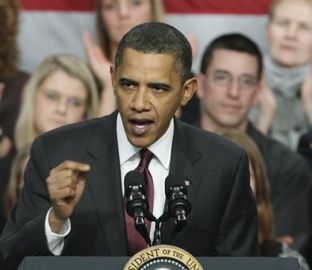Obama not yet certain of outcomes of engagement with Sudan
By Daniel Van Oudenaren
February 2, 2010 (WASHINGTON) – President Barack Obama revealed in an interview Monday with YouTube, a video-sharing website banned in Sudan, that he and his advisors have not yet concluded whether ‘engagement’ with Sudan will result in meeting their goals. The president referred to brokering a peace agreement between Khartoum and Darfur rebels as “the next step in the challenge.”

President Obama also pointed out also that the Administration had achieved its “first task” in Darfur by negotiating the entry of some replacement aid capacity after 13 international aid groups were expelled in March 2009 for alleged collusion with the International Criminal Court. “We were able to get that assistance back in to help at least initially stabilize the situation.”
In his remarks the president linked a political settlement of the conflict to the return of the population of roughly three million displaced people.
“We continue to put pressure on the Sudanese government,” said President Obama, referring to the Darfur. “If they are not cooperative in these efforts, then it is going to be appropriate for us to conclude that engagement doesn’t work, and we’re going to have to apply additional pressure on Sudan in order to achieve our objectives. But my hope is, that we can broker agreements with all the parties involved to deal with what has been enormous human tragedy in that region,” he said.
This is the first time that the president himself has referred to his Administration’s policy overall as “engagement.” His remark is also an indication that he is not yet decided on whether engagement “works,” as he put it.
The president’s special envoy since his first trip to Khartoum in April 2009 has met with top Sudanese officials, although not apparently with President Omer Al-Bashir. Mr. Gration stated in October that “broad, deep engagement” with parties including the ruling National Congress is fundamental to the U.S. strategy. He has defended the Administration’s diplomatic efforts on the grounds that they wrought progress in mediating outstanding issues between the ruling party and its ex-nemesis, the Sudan People’s Liberation Movement, and between Sudan and Chad which were each supporting rebels against the other.
In response to the U.S. president’s statement, a member of the Sudanese government delegation at Doha downplayed the importance of the president’s mention of pressuring Sudan’s government in order to achieve peace in Darfur. Omer Adam Rahama told the state Sudan News Agency (SUNA) that such pressure is unnecessary since the government is already aware of its duty toward its people.
Seifeldin Omer Yasin, the Embassy of Sudan’s press counsellor said in an e-mail Monday that the U.S. and Sudan “remain engaged in talks to resolve their differences. For its part, Sudan has made good on its promises and commitments. The Darfur conflict, an issue that occupied a monumental spot within the international community, has subsided today, thanks to the immense efforts exerted by all involved…. the U.S. must put this progress into account in order for the two countries to move forward.”
But Mr. Obama’s diplomatic approach has come under fire in other quarters. “Our position is that the U.S. policy of engagement with Khartoum has emboldened the ruling party,” Leonard A. Leo, chairman of the United States Commission for International Religious Freedom said in an interview today with Sudan Tribune. The commission chairman, who visited Sudan in both December and January, cited crackdowns on opposition members and unchecked security powers that could affect the April elections.
“I think it’s important that the Administration announce what specifically it’s been doing to ensure free and fair elections,” said Mr. Leo, “…there are just a lot of unanswered questions about the Administration’s involvement in some of this and where it’s headed. I think that would be my major concern on what’s going on here.”
(ST)
